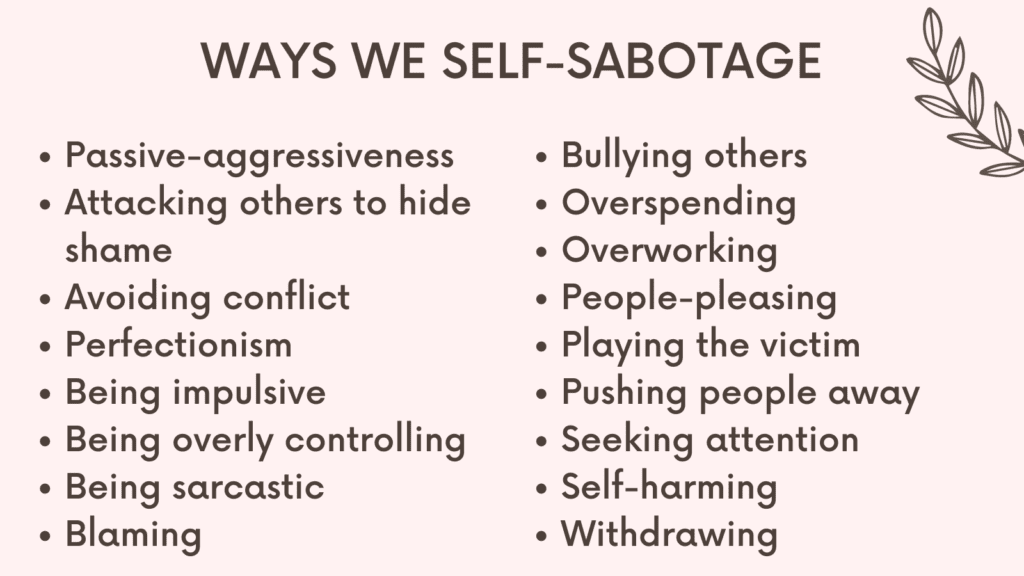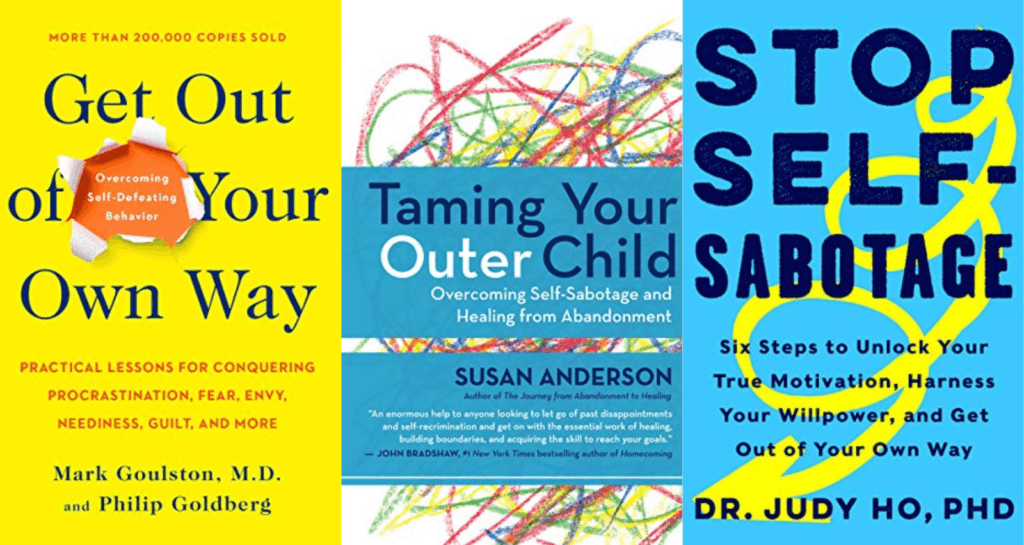This post contains some of the best self-sabotage journal prompts to help you overcome self-sabotage.
What Is Self-Sabotage?
Self-sabotage refers to behaviors or thought patterns that hold an individual back from achieving their goals or fulfilling their potential.
It often involves sabotaging one’s own efforts, either consciously or subconsciously, due to limiting beliefs, fears, or negative self-talk.
Self-sabotage can lead to feelings of frustration, lack of confidence, and a sense of being stuck or stagnant in one’s personal or professional life.
Related: How To Step Out Of Denial? Top 10 Steps To Overcome Denial When The Truth Is Heartbreaking
Examples of Self Sabotaging Behaviors
Self-sabotaging behaviors are actions or patterns of behavior that can prevent us from achieving our goals and fulfilling our potential.
Some common examples of self-sabotaging behaviors include:
1. Procrastination: Putting off tasks until the last minute, which can lead to missed deadlines and added stress.
2. Negative self-talk: Constantly criticizing oneself and having a negative self-image can lead to low self-esteem and decreased motivation.
3. Overthinking: Overanalyzing situations can lead to indecision, anxiety, and missed opportunities.
4. Self-medication: Using drugs or alcohol to cope with stress or difficult emotions can worsen existing problems and create new ones.
5. People-pleasing: Putting others’ needs and desires above one’s own can lead to resentment and burnout.
6. Perfectionism: Striving for perfection can lead to self-doubt, fear of failure, and procrastination.
7. Avoidance: Avoiding uncomfortable situations can prevent growth and progress towards goals.
8. Impulsive behavior: Acting on impulse without thinking through the consequences can lead to regrettable decisions and negative consequences.
Related: Best 20 Tips On How To Let Go Of Perfectionism
Self Sabotage Journal Prompts
1. What are some common self-sabotaging behaviors or patterns that I engage in?
2. When did I first start noticing these self-sabotaging behaviors or patterns, and how have they affected me throughout my life?
3. What are some of the underlying beliefs or fears that drive my self-sabotage? What would I tell a dear friend who has the same belief?
Common negative beliefs include:
- “I’m not good enough”
- “I don’t deserve happiness/success”
- “I always fail”
- “I’m not attractive/likable”
- “I’m not smart enough”
- “I’m a burden to others”
- “Success is impossible for me”
- “Nobody cares about me”
- “I’m a loser/failure”
- “I’ll never be happy”
Related: Negative Core Beliefs List (& 8 Tips On How To Challenge Them)
4. How do these beliefs or fears hold me back from achieving my goals or living the life I desire?
5. In what ways do I engage in self-sabotage to avoid uncomfortable feelings or situations?
6. How has self-sabotage affected my relationships with others?
7. What triggers my self-sabotage and how can I become more aware of these triggers?
8. What are some past experiences or traumas that may contribute to my self-sabotaging behaviors?
Related: How To Break Generational Trauma? 5 Steps To Release Trauma & End Self-Sabotage
9. What are some positive coping mechanisms I can use instead of engaging in self-sabotage?
10. How can I improve my self-esteem and confidence to reduce self-sabotage?
11. How can I practice self-compassion when I engage in self-sabotage?
Some self-compassion statements you can repeat to yourself include:
- It’s okay to make mistakes; I’m only human.
- I deserve love and kindness, just like everyone else.
- I am doing the best I can in this moment.
- My feelings are valid and important.
- I am proud of myself for trying, even if I didn’t achieve my goal.
- I am constantly learning and growing, and that’s a good thing.
Related: How To Be Gentle With Yourself? Top 5 Ways To Practice Self-Compassion
12. What are some healthy boundaries I can set to prevent self-sabotage? (e.g. a time limit for social media use, create a budget and stick to it, saying “no” to commitments that don’t align with my priorities, etc.)
13. How can I identify and challenge negative self-talk that often leads to self-sabotage?
The following are some prompts to help you challenge your limiting beliefs:
- What evidence do I have that supports this negative belief?
- What evidence do I have that contradicts this negative belief?
- How would my life be different if I didn’t believe this negative thought?
- Can I think of any past situations where this negative belief was proven wrong?
- What would my best friend or someone I love say to me if they heard me expressing this negative belief about myself?
- What is the worst possible outcome of challenging this negative belief?
- Have I looked at all the possibilities, or am I only focusing on the negative?
- Can I find any positive aspects or silver linings in this situation?
- Is there any way I can reframe this negative belief into something more positive and empowering?
- What actions can I take to challenge this negative belief and replace it with a more positive and helpful one?
14. What are some practical steps I can take to break free from self-sabotaging habits?
15. How can I build a support system to help me overcome self-sabotage?
16. How can I incorporate self-care practices into my routine to reduce self-sabotage?
17. What are some ways I can practice mindfulness and stay present in the moment to reduce self-sabotage?
The following are some ways to practice mindfulness:
- Mindful breathing: Focus on your breath and observe every inhale and exhale. Pay attention to how it feels as the air enters and leaves your body.
- Body scan: Close your eyes and slowly move your attention from the top of your head down to your toes, noticing any sensations or tension in each part of your body.
- Mindful eating: Slow down and savor each bite of food, paying attention to its texture, taste, and smell.
- Mindful walking: Walk slowly and deliberately, paying attention to each step you take, how your feet feel on the ground, and your surroundings.
- Mindful listening: Listen with intention, focusing fully on what the other person is saying without interrupting or planning a response.
- Mindful journaling: Write down your thoughts and feelings without judgment, observing them from a distance.
- Mindful meditation: Sit quietly and focus on your breath or a word or phrase, letting thoughts come and go without getting caught up in them.
Related: Best 6 Mindfulness Exercises For Beginners (+FREE Resources)
18. What are some unhealthy coping mechanisms I need to let go of to overcome self-sabotage?
19. How can I set realistic goals and expectations for myself to reduce self-sabotage?
20. What are some positive affirmations that can help me overcome self-sabotage?
The following are some examples:
- I am worthy of success and happiness.
- I trust in my abilities and know that I can achieve my goals.
- I release all negative self-talk and focus on positive thoughts.
- I am in control of my thoughts and actions, and choose to act in my best interest.
- Every challenge presents an opportunity for growth and learning.
- I give myself permission to make mistakes and learn from them.
- I deserve to be happy and fulfilled in all areas of my life.
- I trust the journey of my life and know that everything happens for a reason.
- I honor and respect my own needs and desires.
- I am capable and worthy of achieving my dreams.
21. How can I practice gratitude to shift my mindset away from self-sabotage?
Related: Best 7 Self Sabotage Books
FREE Self-Sabotage Worksheets PDF
Conclusion
Self-sabotage can hold you back from living a fulfilling and happy life.
It’s important to recognize these patterns of behavior and seek support to overcome them.
This may include working with a therapist, practicing self-care, and developing healthy coping mechanisms.




